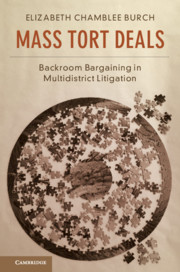Book contents
- Mass Tort Deals
- Mass Tort Deals
- Copyright page
- Dedication
- Contents
- Figures
- Tables
- Acknowledgments
- Introduction
- 1 When Mass Torts Meet Multidistrict Litigation
- 2 Quid Pro Quo Arrangements?
- 3 The Rise of Repeat Players
- 4 Judges as Bulwarks and Nudgers
- 5 When Multidistrict Litigation Settles into “Alternative Dispute Resolution”
- 6 Reforming Multidistrict Litigation
- Conclusion
- Appendix
- Index
2 - Quid Pro Quo Arrangements?
Published online by Cambridge University Press: 16 May 2019
- Mass Tort Deals
- Mass Tort Deals
- Copyright page
- Dedication
- Contents
- Figures
- Tables
- Acknowledgments
- Introduction
- 1 When Mass Torts Meet Multidistrict Litigation
- 2 Quid Pro Quo Arrangements?
- 3 The Rise of Repeat Players
- 4 Judges as Bulwarks and Nudgers
- 5 When Multidistrict Litigation Settles into “Alternative Dispute Resolution”
- 6 Reforming Multidistrict Litigation
- Conclusion
- Appendix
- Index
Summary
Chapter 2 poses three provocative questions: Do plaintiffs’ lawyers in leadership profit from quid pro quo arrangements with one another and with repeat defense attorneys? Even if one can fairly characterize features of their deals as self-serving, what harm is there? And if the deals do harm plaintiffs in some way, what leverage do plaintiffs have? In many respects, outsiders can only guess at the answers to the first two questions because they are privy neither to the negotiations nor to the private settlement’s payouts. But there is not a complete void; this chapter grounds its suppositions in the available data on the common-benefit fees that lead plaintiffs’ attorneys receive, and the private settlements they negotiate. Examining settlements that occurred over a 12-year span, every deal featured at least one “closure” provision for defendants (that helped end the lawsuits by goading plaintiffs to take the deal), and likewise contained some provision that increased lead plaintiffs’ lawyers’ common-benefit fees. Based on that evidence (along with the scant evidence on payouts to plaintiffs), there is reason to worry that when insiders play for rules, the rules they develop may principally benefit them at the plaintiffs’ expense.
Keywords
- Type
- Chapter
- Information
- Mass Tort DealsBackroom Bargaining in Multidistrict Litigation, pp. 35 - 71Publisher: Cambridge University PressPrint publication year: 2019



